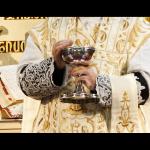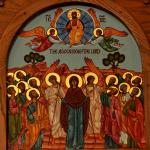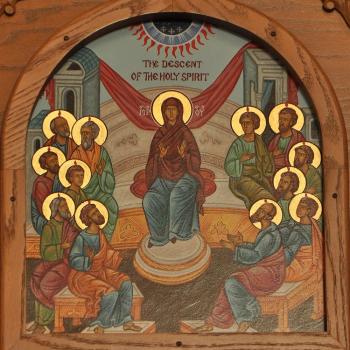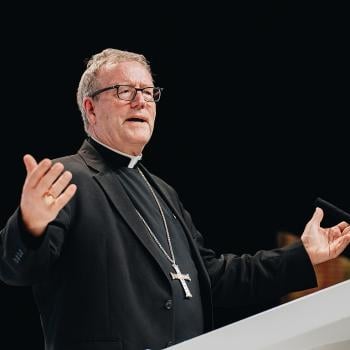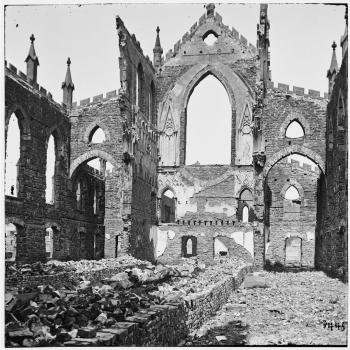
We cannot control the Holy Spirit. “The wind blows where it wills, and you hear the sound of it, but you do not know whence it comes or whither it goes; so it is with every one who is born of the Spirit” (Jn. 3:8 RSV). This is why we must be careful when promoting various spiritual techniques, making sure people realize that they are not ways to manipulate and control the Holy Spirit. When engaged properly, they leave us open to the prompting of the Holy Spirit in our lives so that we are ready and willing to cooperate with them, instead of making the Holy Spirit make then when we prompt it to. Sadly, many treat spiritual practices magical rites, which if done correctly, will leave them in control of the Spirit, that the Spirit will have to do what they tell it to do. This is not the case, and if we engage a practice with that kind of mentality, by trying to control the Spirit in that fashion, we will end up grieving the Spirit, closing ourselves off from it and the spiritual gifts which we seek. We will be let down, and, as things did not go as we expected, we will begin to question our faith, wondering if anything is as we think it is. This is why church officials should be careful and not promise the faithful too much if they embrace some spiritual practice, or go to a particular ecclesiastically sponsored event, such as the Eucharistic Congress in Indianapolis.
Why, then, is the 2024 Eucharistic Congress meeting in Indianapolis promoting itself with the most grandiose terms, such as representing it as a new Pentecost? People are being told to go so that their lives can be changed, changed, for the better, as the Holy Spirit is preparing to make its way anew into the world, as, for example, the way the Eucharistic Congress is being represented on its registration page:
Jesus is calling us back to our first love for a new Pentecost. Whether you can come for only one day or all five, you are invited to experience profound personal renewal and be set ablaze to share Christ’s love with your community.
Similarly, Maria Wiering, writings for The Evangelist, the Official Publication for the Diocese of Albany, tells us:
Leaders hope attendees become “a leaven for the church in the United States as Eucharistic missionaries going back to their parishes, but also (become) a gathering of people who are standing in the breach, or in proxy, for the entire church across the United States, inviting that new Pentecost, and that new sending (of) healing and life to the full,” said Tim Glemkowski, CEO of the National Eucharistic Congress Inc., in a recent meeting with media.
[…]
Catholic leaders have described the National Eucharistic Congress as potentially transformational for the Catholic Church in the U.S.[1]
The Archbishop of Indianapolis, Charles C. Thompson, on the USCCB Website, suggests that the event will be transformational for the church in the United States:
The 10th National Eucharistic Congress will be a defining moment for this generation and the beginning of a new chapter for the Church in the United States. I am proud that it will be held in the Archdiocese of Indianapolis, the archdiocese the Holy Spirit has placed under my guidance. For the first time in nearly a century, the Catholic Church from every corner of the United States is about to gather in one place. More than just a retreat or conference, the National Eucharistic Congress will be a pivotal moment in both American history and the legacy of the Catholic Church.
The promises being given are far too great, as they are very presumptuous; they give the faithful expectations which are going to be hard to meet. The Holy Spirit cannot be controlled or manipulated in this fashion, to make sure it will come upon those who go as if they have found themselves in the middle of a New Pentecost. What, exactly, would a New Pentecost be? This is not to say, while they are there, the faithful might not find the event stimulating, and due to all the excitement, given them an initial boost to their faith. However, just like the enthusiasm and excitement which happens at a large concern fades away days after it is over, so it is likely, the initial excitement felt at the Eucharistic Congress (if one felt any) will fade. What, then? What kind of preparation is being made for that?
Promoting the Eucharistic Congress as a New Pentecost, as a key point in the history of the church in the United States, is ridiculous, especially since the Congress, and the eucharistic initiative which lay behind it, has been based upon falsehoods, such as the claim that many, if not most, Catholics do not believe in the eucharistic presence of Christ. Many of the prominent speakers involved with the event, likewise, are quite troubling, as they are often those who are working against the initiatives of Pope Francis and instead are promoting extreme right-wing ideological movements. There is a sense, and has been a sense for quite some time, that the Eucharistic Congress is more a political event, aimed to control and manipulate the way Catholics vote, than it is to truly promote the eucharist. We can see this in the way many in the USCCB have been playing politics with the eucharist, constantly attacking politicians coming from the left, questioning whether they should be admitted to communion, while d politicians on the right, who likewise act against and ignore the teachings of the church, are given a free pass (after all, why has the USCCB not questioned those who promote the death penalty or those who attack the dignity of migrants and the poor?).
A true eucharistic revival would connect with and supplement the preferential option for the poor, and bishops would be using the opportunity to make it known and to warn those who resist it the fate of those who ignore the presence of Christ in the poor
When the poor are oppressed by their rulers, good priests [bishops] – in order to deliver them from this – offer them the help of their protection and they do not fear the hostility of any of their enemies. Rather, they openly confront the oppressors of the poor, they reproach them, they excommunicate them, and they have little fear of their plots to harm them even if they are able to harm them: “The good shepherd lays down his life for the sheep” (John 10:11). [2]
The Eucharistic Congress, and the years which have led to it, has not taken for its foundation all the ways Christ is present in the world. It should have, for that is how Christ’s presence in the eucharist can best be represented. They should have been shown various ways Christ’s could be made present in the world, and how all those ways are connected with but also distinct from the eucharistic presence. Much care should have been done to make sure the faithful understand the eucharist is not a magical talisman. They should be told just as bread and wine are transformed into Christ, so they, upon reception of communion find themselves joined with and transformed into the body of Christ. They should have been told that their reception of the eucharist is not the end, but just the beginning, that they are to become Christ’s presence in the world, doing the things which Christ did in his temporal ministry: going to the sick, the poor, the oppressed, and finding a way to help them.
The Eucharistic Congress should not be promoted as a New Pentecost but rather, as a way to reestablish what Christ and Christ’s presence means for the world and the structures of sin which can be found in it. For then it would encourage the faithful to be open to the prompting of the Spirit in their lives instead of having them expect the Spirit will do things which it may or may not do. They will not be promised too much, and as a result, they will not experience the kind of spiritual desolation which is possible if and when what they are promised does not happen.
[1] Maria Wiering, “A ‘New Pentecost’” in The Evangelist (3-6-2024).
[2] St. Isidore of Seville, Sententiae. Trans. Thomas L. Knoebel (New York: Newman Press, 2018), 195.
Stay in touch! Like A Little Bit of Nothing on Facebook.
If you liked what you read, please consider sharing it with your friends and family!
N.B.: While I read comments to moderate them, I rarely respond to them. If I don’t respond to your comment directly, don’t assume I am unthankful for it. I appreciate it. But I want readers to feel free to ask questions, and hopefully, dialogue with each other. I have shared what I wanted to say, though some responses will get a brief reply by me, or, if I find it interesting and something I can engage fully, as the foundation for another post. I have had many posts inspired or improved upon thanks to my readers.


